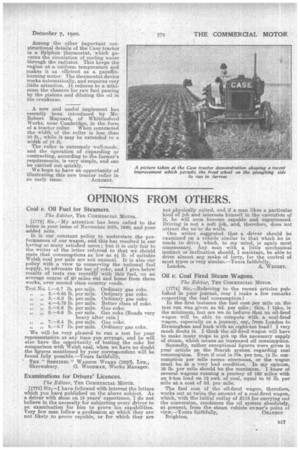OPINIONS FROM OTHERS.
Page 27

If you've noticed an error in this article please click here to report it so we can fix it.
Coat v. Oil Fuel for Steamers.
The Editor, THE COMISEIERCIAL MOTOR.
[1772] Sir,—My attention has been called to the letter in your issue of November 16th, 1920, and your added note.
It is our constant policy to understate the performances of our wagon, and this has resulted in our having so many satisfied users • but it is only fair to the writer of the letter referred to that we should state that consumptions as low as 4-i lb. of suitable Welsh coal per mile are not unusual. It is also our policy' with a view to conserving the national fuel supply, to advocate the use of coke, and I give below results of tests run recenEN with this fuel, on an average course of 60 miles out and home from these works, over second class country roads.
Test No. 1.-6.7 lb. per mile. Ordinary gas coke. 2.-6.65 lb. per mile. Ordinary gas coke. 3.-6.2 lb. per mile. • Ordinary gas coke. 4.-4.79 lb. per mile. Better class of coke. 5.-5.6 lb. per mile. Gas coke. 6.-6.6 lb. per mile. Gas coke (Roads very heavy after rain.) „ 7.-6.4 lb. per mile. Gas coke. „ „ 8.-5.7 lb. per mile. Ordinary gas coke.
We will be very pleased to run a test for your representative at any time you arrange, and he will also have the opportunity of testing the coke for comparison with Welsh coal, when we have no doubt the figures mentioned by your correspondent will be found fully possibIe.—Yours faithfully,
THE " SENTINEL " WAGGON WORKS (1920), LTD.,
Shrewsbury. G. WOODMAN, Works Manager.
Examinations for Drivers' Licences.
The Editor, THE COMMERCIAL MOTOR.
[17731 Sir,—I have, followed with interest the letters which you have published on the above subject. As a driver with close on 15 years' experience, I do not believe in the necessity for subjecting every driver to an examination for him to prove his capabilities. Very few men follow a profession at which they are not likely to prove capable, or for which they are
not physically suited, and if a man likes a particular kind of job and interests himself in the execution of it, he will soon become capable and. experienced. Driving is not a soft job, and, therefore, does not attract the ne'er do wells.
One writer suggested that a driver should be examined on a vehicle similar to that which he intends to drive, which, to my mind, is again most unnecessary. Any man with a little mechanical instinct or inclination should, I maintain, be able to drive almost any make of lorry, for the control of most types is very similar.—Yours faithfully„
London. A. WRIGHT.
Oil v. Coal Fired Steam Wagons.
The Editor, THE COMMERCIAL MOTOR.
[1774] Sir,—Referring to the recent articles published in your journal, may I make a few remarks respecting the fuel consumption./ In the first, instance the fuel cost per mile on the test run was given as 6d. per mile; this, I take, is the minimum, but are we to believe that an oil-fired wagon will be able to compete with a coal-fired wagon, especially on a, journey, say, from London to Birmingham and back with an eight-ton load? I very much doubt it. I think the oil-fired wagon will have to make many stops to get up the necessary supply of steam, which means an increased oil consumption.
Secondly, rather exceptional figures were given in your article on the Scarab system regarding coal consumPtion. Even if coal is 70s. per ton, 15 lb. consumption per mile seems enormous, or the wagon must be in a very bad condition. In my opinion, 10 lb. per mile should be the maximum. I know of several wagons running a journey of 160 miles with an 8-ton load on 12 cwt. of coal, equal to 81 lb. per mile at a cost of 3d. per mile.
The fuel cost of the oil-fired wagon, therefore, works out at twice the amount of a coal-fired wagon, which, with the initial outlay of 2118 for carrying out the conversion, condemns the oil system absolutely, at present, from the steam vehicle ovner's point of
view.—Yours faithfully, CHARDON. Brighton.






























